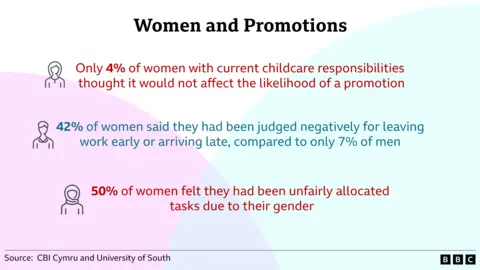Cleaning up the barriers facing women at work
 Mrs Buckét
Mrs BuckétRachael Flanagan wants to smash one of the oldest office stereotypes.
"Gone are those days where someone's hunched over a mop,” said the founder of Mrs Buckét, the cleaning company she started after failing her business A-level exam.
Her workforce is largely female, and she wants to help remove the barriers facing women in other workplaces.
Business lobby group CBI Cymru found discrimination and unconscious bias were holding women back from leadership roles, and more affordable childcare would open up their career prospects.
The CBI said helping more women to fulfil their potential, and moving into leadership roles, could have a “significant impact” on the Welsh economy.
For Ms Flanagan, from Swansea, it means empowering and supporting women who might suffer from "imposter syndrome" and who lack the confidence to put themselves forward for senior roles.
“I've had managers that have worked with me, and I've had several conversations with them on the sidelines to say ‘you can really do this’," she said.

She said the men in the office also needed to be part of the change in attitudes.
"It shouldn't be up to women to have to smash their way through all these different hurdles," she said.
“The blokes in the room should be realising that they themselves are closing off opportunities, that there's something about the culture in business which has made it difficult for women.”
At 37, Ms Flanagan has built a business employing more than 400 people in south Wales, using the latest technology to clean offices, schools and specialist sites.
This is not the part-time, low-skilled cleaning work that traditionally saw women in tabards running dusters around desks.
Ms Flanagan said some of her wisest mentors had been men, but she was often the only woman in a room of chief executives and company founders.
So when it comes to improving the opportunities for women, the culture starts in her own workplace with flexible working and trust in her staff who will complete their work and still make the school run.
"There are employers out there who really do give flexible working patterns," Ms Flanagan said.
Her advice: "Move [to] those companies so you can excel.
She added: “Just because you've got small children doesn't mean that you can't still move on in your career as well.”
 Mrs Buckét
Mrs BuckétResearch by the Confederation of British Industry (CBI) Cymru and the University of South Wales highlighted the issues facing women with leadership ambitions.
“We can’t deny that progress has been made,” said the CBI’s chief people officer, Asha Musoni.
“But structural institution and cultural barriers still exist.
“Those specific barriers are around flexible working, access to adequate childcare, gender bias at work, lack of mentorship opportunities and support for working fathers.”
Some of the data laid bare the disparity between the experiences of men and women in the workplace.
Only 11% of men, compared with 48% of women, believed they were passed over for opportunities due to their gender
"And when you think about when they actually do get into these senior roles, 44% of women say that they are unfairly allocated tasks,” Ms Musoni said.
"Even giving people the opportunities, and then not allowing them this space and opportunity to flourish, is showing as a problem that we need to get behind and think about how we overcome that."
Rachael Flanagan said one of the most important incentives for women to pursue leadership roles was to witness the success of others.
“If you can't see it, you can't be it,” she said.
